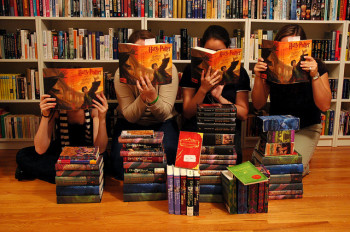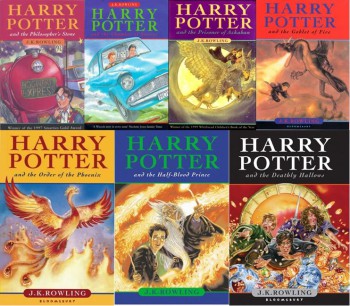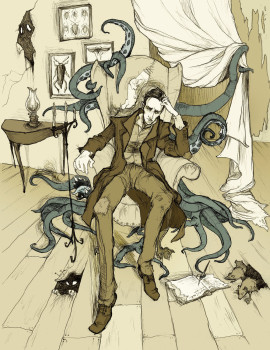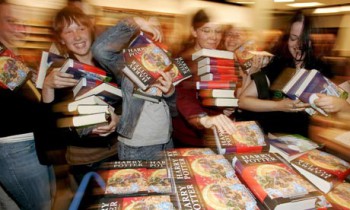Raised On Potter: Give the People What They Want?
 As I mentioned in a recent post, I just finished teaching a creative writing course. Most of my students were college sophomores. None were creative writing majors. To cut a successful swath through my class, they had to write a short story, a poem, and a short play — and then revise each one multiple times. In order to bring a proper perspective to their efforts, I forced them (at dagger point) to read a great many examples of each form.
As I mentioned in a recent post, I just finished teaching a creative writing course. Most of my students were college sophomores. None were creative writing majors. To cut a successful swath through my class, they had to write a short story, a poem, and a short play — and then revise each one multiple times. In order to bring a proper perspective to their efforts, I forced them (at dagger point) to read a great many examples of each form.
Thus ends the exposition. Now for the drama!
At the tail end of the semester, I asked my students to rank each reading on a five point scale, with one being exceptional and five a yawner. Imagine my surprise when I discovered that without exception, it was the fantasy and horror offerings on my syllabus that drew the strongest responses.
What can account for this?
My answer: J.K. Rowling.
 Fact: if there is one book (or series) with which ALL my students were familiar, it is Harry Potter. This generation has been raised on fantastic fiction and they crave more.
Fact: if there is one book (or series) with which ALL my students were familiar, it is Harry Potter. This generation has been raised on fantastic fiction and they crave more.
I suppose that’s good news, right? The group of young adults whom I just labeled “this generation” are going to keep a lot of fantasy writers employed for decades to come.
Let’s take a closer look at what they loved (and let’s also concede that this was a small class, and that I’d be the first to admit that a sample size of six does not exactly guarantee a statistical trend; even so, I find their responses remarkable).
They fell in love first with H.P. Lovecraft’s “The Music of Eric Zann,” a creepy short in which a mad violinist beats back cosmic desolation (Cthulhu’s pals keep trying to float through the man’s garret window) by playing insane, entirely improvised solos. Five of my students gave “Zann” a one, the highest rating possible. The sixth, possibly having fallen from a high window, gave it a two.
F. Marion Crawford’s “The Upper Berth,” a trans-oceanic spookfest from 1896 that I’ve mentioned before (HERE), drew similar enthusiasm: three ratings of one, two ratings of two, and an outlier who hated it or was possibly stuck headfirst in a porthole, with a five.
 Raccoona Sheldon made the team-sheet with “The Screwfly Solution.” Raccoona, of course, was really Alice Sheldon, and her tale of femicide and hormones gone wrong mimicked Lovecraft perfectly: 1,1,1,1,1,2.
Raccoona Sheldon made the team-sheet with “The Screwfly Solution.” Raccoona, of course, was really Alice Sheldon, and her tale of femicide and hormones gone wrong mimicked Lovecraft perfectly: 1,1,1,1,1,2.
Karen Russell’s “Vampires In the Lemon Grove” split the class evenly between those who adored it (scores of one) and those who liked it very much (scores of two). And yes, in this whimsical recasting of vampirism, our toothy friends can get by on lemon juice. Sort of. Worth noting: two of my students took the time to write in that this was their favorite story of the semester, hands down.
“Anda’s Game,” by Cory Doctorow, isn’t technically a fantasy, but it revolves around two girls careening their way through a World of Warcraft adventure, with political ramifications and genuinely upsetting questions about how the game’s online economy has real world impacts. The scores? 1,1,1,2,2,4.
Now compare the responses to my many strictly realistic offerings. (I’ll leave aside, for purposes of clarity, the plays and poems.) By and large, my students actively disliked Sherman Alexie and Charles Baxter, and they despised Tom Bissell. Average scores for all of these were about 4.5. They gave no credence to Tim O’Brien (average score 3) and were split by writers as diverse as Joyce Carol Oates, Donald Barthelme, and Raymond Carver. Yes, they generally gave high marks to Z.Z. Packer (“Brownies”) and Jennifer Egan (“Selling the General”), but overall the trend was clear: stories lacking an element of magic or the inexplicable were not held in high regard.
 So much for good old red-blooded American (“American”) Realism.
So much for good old red-blooded American (“American”) Realism.
My students’ veneration of fantasy extended to their own written work, where one story involved a possessed leather biker’s jacket, while another blasted off for the stars (a piece that inspired my last Black Gate posting, HERE). One of their short plays featured a random visitation from a traipsing elephant, and that in an otherwise normal hotel lobby.
These young people interact daily, hourly, with the real-world offspring of science fiction: smart phones, tablets, and social media interfaces with extraordinary capacities and ludicrous limitations. Magic, for them, is everyday stuff. Previous generations — the folks that grew up on Enid Blyton, L. Frank Baum, Robert E. Howard, and Greek mythology — had to put their fantasies behind when their book covers closed, but now? Other worlds stream past constantly, on Youtube, Google, and elsewhere. Fantasy is never more than an icon away.
As for Harry Potter and Co., my students this semester were born, by and large, in 1994. Harry Potter and the Philosopher’s Stone hit London’s shelves in June of 1997, then jumped to the States in 1998. Rowling’s books have literally tracked these students through their youth, and when the books stopped coming, the Radcliffe movies filled the void. Fantasy is the milieu that speaks to this generation most strongly; it’s tied inextricably to their personal development and ongoing maturity. While it may be Joyce Carol Oates who asks, “Where Are You Going, Where Have You Been?” my students’ response will necessarily be, “Hogwarts.”
 In the main, I suppose I’m encouraged. Whereas many of my generation were ostracized or at least marginalized for gravitating toward fantasy, horror, or science fiction, “genre” has now become one hundred percent mainstream. As to whether this will be a Pyrrhic victory will depend on the level of quality and depth these budding consumers demand –– or, as artists, create.
In the main, I suppose I’m encouraged. Whereas many of my generation were ostracized or at least marginalized for gravitating toward fantasy, horror, or science fiction, “genre” has now become one hundred percent mainstream. As to whether this will be a Pyrrhic victory will depend on the level of quality and depth these budding consumers demand –– or, as artists, create.
In the meantime, I’ll be looking with a critical, only somewhat jaundiced eye at my future syllabi and considering whether to add a few more “fabulous” or “slipstream” offerings. Possibly, I should do the opposite. After all, why should I give the people what they want –– the very stuff with which they’re already familiar? Better, perhaps, to force-march them through writers and styles with which they have no experience. Faulkner. Chandler. McCullers. Yann Martel.
Oh, wait. Life Of Pi is a fantasy, too.
I’m surrounded.
Onward.
Mark Rigney has published three stories in the Black Gate Online Fiction library: ”The Trade,” “The Find,” and “The Keystone.” Tangent called the tales “Reminiscent of the old sword & sorcery classics… once I started reading, I couldn’t stop. I highly recommend the complete trilogy.” In other work, Rigney is the author of “The Skates,” and its haunted sequels, “Sleeping Bear,” and Check-Out Time, forthcoming in 2014.
Mark,
I don’t think young people are any more interested in fantasy than they have been since the dawn of time. Almost everyone I’ve ever met hated their literature classes because most of the books that literary PhDs like are awful (or at least boring). The writings of Abdul Alhazred can’t come close to matching the sanity blasting horror of the average college literary syllabus. Kudos to you for offering students something different. I’d still make them read Chandler, though 🙂
“Let’s also concede that this was a small class, and that I’d be the first to admit that a sample size of six does not exactly guarantee a statistical trend; even so, I find their responses remarkable.”
Mark, I taught college freshmen and sophomores from 2002 to 2011, and adding my sample size of an additional several hundred students, I can unequivocally state that your observations square with my own.
The question you raise at the end is a good one, and one I’ve been mulling over. Back in the 1930s C.S. Lewis, when he was an Oxford don, opposed the works of writers like Dickens on the syllabus — not because he didn’t like Dickens (on the contrary, Lewis was a voracious reader of all “levels” of fiction, including H. Rider Haggard and The Magazine of Fantasy and Science Fiction), but because he reasoned that students already read such writers for pleasure “in the bath,” and didn’t really need a college professor annotating the meaning of such near-contemporary popular texts for them.
It has been a strange shift to experience firsthand, this recent welcoming of speculative fiction to the academic table. As I was coming up as a student in the 1990s, there was still a lot of institutional bias against speculative fiction of any stripe. But by the time I had been teaching a few years, there were courses being offered incorporating everything from manga to zombie fiction. I myself taught Topics in Lit. courses on Neil Gaiman, Horror in Literature, and Fantasy in Literature. I felt like we had won. But then I remembered Lewis’s argument, and the question you brought up.
On the other hand, seeing youth engaging in any sustained reading is surely worthwhile in an age of increasingly short attention spans.
I used to tell my students, when they complained about a text not being to their personal taste: You don’t have to love this, but somebody does. Now come up with a character who loves this text, and write me a paragraph in that character’s voice. It helped get them to think about the texts, where they’d been accustomed to checking off mental like/dislike columns and then moving on. Often, they would themselves like the texts much more after this exercise.
Tyr – I can’t agree that most literature is deathly dull, but I’ll happily agree that most of it is taught as if it were, and that when presented “on deadline,” it can slide rapidly toward irrelevance. Nearly all the “important” books I’ve read that I liked, I read on my own time. For whatever reason, that has made all the difference. As for Chandler: yes, more please — even when I think he’s lost his hard-boiled marbles. : )
Nick – I didn’t know that about C.S. Lewis. Thank you for sharing that. Regarding “winning,” I’m not sure that certain wars are ever won. People simply re-dig the trenches, in new (not Flemish) fields.
Sarah – That sounds like an excellent exercise. I may well steal that. Who was it who said, “Theft is basic to all culture”?
Sarah, I concur that your exercise is an excellent idea! I love that in addition to giving them an “in” to the text, it challenges students to try to see a thing through someone else’s eyes — perhaps one of the most important (and underrated) aspects of cognitive development that typically occurs during that phase of adolescence and young adulthood.
I used to assign an exercise that asked students to write out an argument on a topic about which they felt strongly, then turn around and write a counter-argument. I challenged them not to churn out a stereotypical “straw man” version of the other side; rather, could they really try to see the issue from the viewpoint of a person with whom they disagree? Could they try to write it “from the heart,” even though it was not their view? How convincingly they pulled this exercise off was put to the test when they shared both arguments with others in the class, who then tried to identify which argument actually represented the writer’s own view.
This ability to put oneself in someone else’s shoes seems to be second nature for two groups in particular: 1) actors and 2) writers of fiction. It can be disheartening to discover how many people are deficient in it, because its development leads to understanding, empathy, and compassion.
It’s an ability that can be fostered by reading — to reference C.S. Lewis again, who once declared, “My own eyes are not enough for me, I will see through the eyes of others. In reading great literature I become a thousand men and yet remain myself.”
The whole “empathy is best taught through reading” notion seems to be getting a lot of press right now. I don’t disagree. But I can’t remember a time when I didn’t at least try to think “how the other guy felt.” Possibly I’m viewing my life through rose-colored glasses. Or possibly I’ve been reading for a long time! I’ll never know.
Curiously, I’d have to say that in my writing life, I “empathize harder” when working on plays. Drama tends to function as a Socratic dialogue, and the process of testing a thesis out loud forces the dramatist to take every side in the most active possible sense. And not merely to “take a side,” but really delve into how unlikely positions can be held, believed in, acted upon.
Man, this is so far off topic from where I began this post! Love it.
Onward.